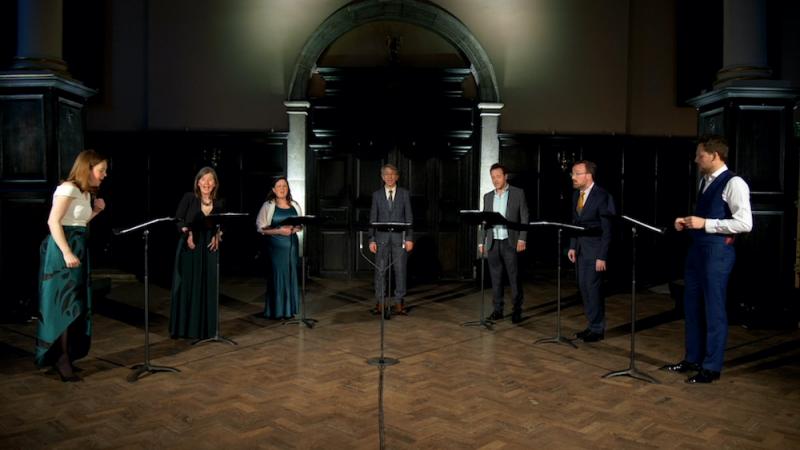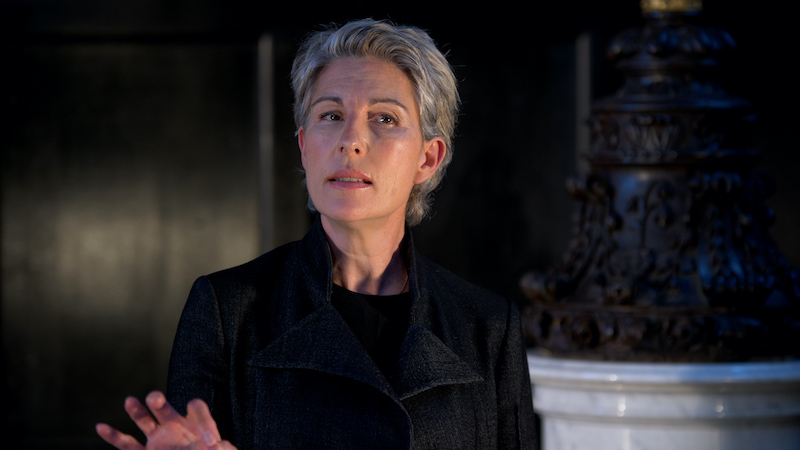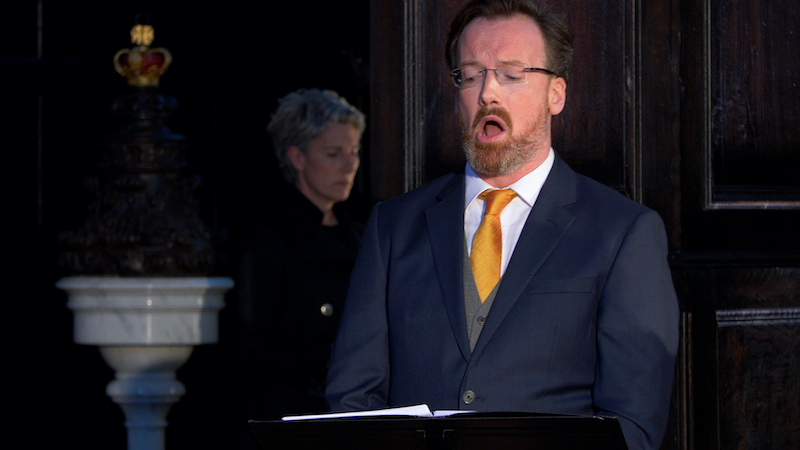Greig, I Fagiolini online review - poetry and music to redeem a damaged world | reviews, news & interviews
Greig, I Fagiolini online review - poetry and music to redeem a damaged world
Greig, I Fagiolini online review - poetry and music to redeem a damaged world
Voces8 spring festival marks Earth Day by 'Re-Wilding the Wasteland'

I Fagiolini do not just do choral concerts. Indeed, director Robert Hollingworth claimed in the pre-concert chat, he finds choral concerts boring.
At Christmas I reviewed their contribution to an earlier Voces8 online festival, in which they combined Charpentier, Howells and Dylan Thomas. Also around the same time they released a short film dramatising Janequin’s extraordinary cantata “The Hunt”. The latest product of Hollingworth’s restless and fertile imagination put TS Eliot’s The Waste Land alongside music that made a journey from bleak despair to the regeneration of hope through the natural world. Once again, it baked together disparate ingredients to make a dish that was intriguingly textured, distinctively flavoured and very nourishing.
As a teenager I was somewhat obsessed with The Waste Land. Of course I didn’t understand it, but I enjoyed the experience of being baffled by it, I loved its changes of register and combination of high and low culture. I had a cassette of Paul Scofield reading it, which I loved, but it could not be further from the performance of Tamsin Greig (pictured below). Where Scofield was craggy, owlish and – yes – a bit ponderous, Greig had a greater variety of pacing, more sharply-drawn character, but also some slightly disjointed rhythms. But she captured the capriciousness of the poem, and its bleached view of a hollowed-out world. Hollingworth spotted a connection between Eliot’s ravaged post-war world of 1921, the religious intolerance of the 16th century and our modern world of nature in crisis. These elements are drawn together by the austerity of Victoria's Tenebrae Responsories, mid-20th century classics and the hopeful perspectives of a handful of new commissions. The most striking of these for me was Ben Rowarth’s response to Byrd’s Deus venerunt gentes. I am not familiar with Rowarth’s work but was immediately taken with his swooping and drooping lines weaving around Byrd’s harmony. Piquant chords using Renaissance-style false relations achieved a stained-glass window monumentality, and I would like to hear more of his music.
Hollingworth spotted a connection between Eliot’s ravaged post-war world of 1921, the religious intolerance of the 16th century and our modern world of nature in crisis. These elements are drawn together by the austerity of Victoria's Tenebrae Responsories, mid-20th century classics and the hopeful perspectives of a handful of new commissions. The most striking of these for me was Ben Rowarth’s response to Byrd’s Deus venerunt gentes. I am not familiar with Rowarth’s work but was immediately taken with his swooping and drooping lines weaving around Byrd’s harmony. Piquant chords using Renaissance-style false relations achieved a stained-glass window monumentality, and I would like to hear more of his music.
Shruthi Rajasekar also blended cultures in Ganga’s Peace, nodding towards Indian music in the portamento at the start and later the rhythmic verbalisation of nonsense syllables. At times the choir found a glassy sound, at others a warmth that spread through the final “shanti” section. The final number, Joanna Marsh’s The World is Charged, offered a redemptive message through pastoral imagery. It had a hymn-like simplicity, enriched by a lush harmony and directness of expression. The music was solid and carefully wrought, the singing restrained and measured. The singing in the Victoria and Byrd – right in I Fagiolini’s wheelhouse – was hard to fault. The Victoria has its sorrow baked into the music and was sung here at its original lower pitch; it’s a miracle of four-voice writing and the singers lingered just enough over the moments of harmonic tension, but never too much. Rebecca Lea’s deft soprano plucked notes from the air, and elsewhere Greg Skidmore (pictured above) sang with character and precision. But it is invidious to single people out: everyone was superb.
The singing in the Victoria and Byrd – right in I Fagiolini’s wheelhouse – was hard to fault. The Victoria has its sorrow baked into the music and was sung here at its original lower pitch; it’s a miracle of four-voice writing and the singers lingered just enough over the moments of harmonic tension, but never too much. Rebecca Lea’s deft soprano plucked notes from the air, and elsewhere Greg Skidmore (pictured above) sang with character and precision. But it is invidious to single people out: everyone was superb.
Perhaps the highlight was Kenneth Leighton’s setting of Gerard Manley Hopkins’s "God’s Grandeur". It was muscular and covered a lot of musical, textural and emotional ground in a brief span. Leighton is a composer I always feel I should know better and I Fagiolini were persuasive advocates here.
This concert was the last in Voces8’s Live from London: Spring festival. As with the Christmas festival that I covered for theartsdesk, it brought together a fantastic range of artists in generously-filled and well-produced concerts, each of which deserved its own attention. They are available online for another week and – in addition to I Fagiolini – I would draw your attention to Joanna MacGregor’s revelatory recital of piano music by black female composers and Voces8 in Bach’s B minor Mass with the Academy of Ancient Music. The season pass offers a range of delights – and I am already looking forward to the summer festival.
rating
Explore topics
Share this article
The future of Arts Journalism
You can stop theartsdesk.com closing!
We urgently need financing to survive. Our fundraising drive has thus far raised £49,000 but we need to reach £100,000 or we will be forced to close. Please contribute here: https://gofund.me/c3f6033d
And if you can forward this information to anyone who might assist, we’d be grateful.

Subscribe to theartsdesk.com
Thank you for continuing to read our work on theartsdesk.com. For unlimited access to every article in its entirety, including our archive of more than 15,000 pieces, we're asking for £5 per month or £40 per year. We feel it's a very good deal, and hope you do too.
To take a subscription now simply click here.
And if you're looking for that extra gift for a friend or family member, why not treat them to a theartsdesk.com gift subscription?
more Classical music
 Monteverdi Choir, ORR, Heras-Casado, St Martin-in-the-Fields review - flames of joy and sorrow
First-rate soloists, choir and orchestra unite in a blazing Mozart Requiem
Monteverdi Choir, ORR, Heras-Casado, St Martin-in-the-Fields review - flames of joy and sorrow
First-rate soloists, choir and orchestra unite in a blazing Mozart Requiem
 Cho, LSO, Pappano, Barbican review - finely-focused stormy weather
Chameleonic Seong-Jin Cho is a match for the fine-tuning of the LSO’s Chief Conductor
Cho, LSO, Pappano, Barbican review - finely-focused stormy weather
Chameleonic Seong-Jin Cho is a match for the fine-tuning of the LSO’s Chief Conductor
 Classical CDs: Shrouds, silhouettes and superstition
Cello concertos, choral collections and a stunning tribute to a contemporary giant
Classical CDs: Shrouds, silhouettes and superstition
Cello concertos, choral collections and a stunning tribute to a contemporary giant
 Appl, Levickis, Wigmore Hall review - fun to the fore in cabaret and show songs
A relaxed evening of light-hearted fare, with the accordion offering unusual colours
Appl, Levickis, Wigmore Hall review - fun to the fore in cabaret and show songs
A relaxed evening of light-hearted fare, with the accordion offering unusual colours
 Lammermuir Festival 2025, Part 2 review - from the soaringly sublime to the zoologically ridiculous
Bigger than ever, and the quality remains astonishingly high
Lammermuir Festival 2025, Part 2 review - from the soaringly sublime to the zoologically ridiculous
Bigger than ever, and the quality remains astonishingly high
 BBC Proms: Ehnes, Sinfonia of London, Wilson review - aspects of love
Sensuous Ravel, and bittersweet Bernstein, on an amorous evening
BBC Proms: Ehnes, Sinfonia of London, Wilson review - aspects of love
Sensuous Ravel, and bittersweet Bernstein, on an amorous evening
 Presteigne Festival 2025 review - new music is centre stage in the Welsh Marches
Music by 30 living composers, with Eleanor Alberga topping the bill
Presteigne Festival 2025 review - new music is centre stage in the Welsh Marches
Music by 30 living composers, with Eleanor Alberga topping the bill
 Lammermuir Festival 2025 review - music with soul from the heart of East Lothian
Baroque splendour, and chamber-ensemble drama, amid history-haunted lands
Lammermuir Festival 2025 review - music with soul from the heart of East Lothian
Baroque splendour, and chamber-ensemble drama, amid history-haunted lands
 BBC Proms: Steinbacher, RPO, Petrenko / Sternath, BBCSO, Oramo review - double-bill mixed bag
Young pianist shines in Grieg but Bliss’s portentous cantata disappoints
BBC Proms: Steinbacher, RPO, Petrenko / Sternath, BBCSO, Oramo review - double-bill mixed bag
Young pianist shines in Grieg but Bliss’s portentous cantata disappoints
 theartsdesk at the Lahti Sibelius Festival - early epics by the Finnish master in context
Finnish heroes meet their Austro-German counterparts in breathtaking interpretations
theartsdesk at the Lahti Sibelius Festival - early epics by the Finnish master in context
Finnish heroes meet their Austro-German counterparts in breathtaking interpretations
 Classical CDs: Sleigh rides, pancakes and cigars
Two big boxes, plus new music for brass and a pair of clarinet concertos
Classical CDs: Sleigh rides, pancakes and cigars
Two big boxes, plus new music for brass and a pair of clarinet concertos
 Waley-Cohen, Manchester Camerata, Pether, Whitworth Art Gallery, Manchester review - premiere of no ordinary violin concerto
Images of maternal care inspired by Hepworth and played in a gallery setting
Waley-Cohen, Manchester Camerata, Pether, Whitworth Art Gallery, Manchester review - premiere of no ordinary violin concerto
Images of maternal care inspired by Hepworth and played in a gallery setting

Add comment